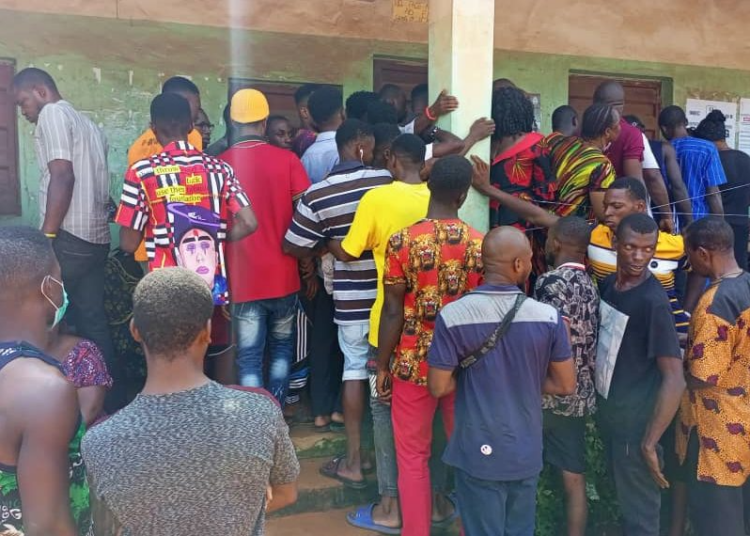Most Nigerians and civil society organisations heaved a sigh of relief when the House of Representatives threw out the highly contentious bill seeking to make the exercise of voting rights mandatory for the citizenry.
The bill, co-sponsored by Speaker Tajudeen Abbas and Hon. Daniel Asama Ago (LP, Bassa/Jos North Federal Constituency of Plateau State), proposed to amend the Electoral Act, 2022, to make voting compulsory for all eligible Nigerians, with penalties including fines of ₦100,000, six months’ imprisonment, or both.
Supporters of the bill argued that poor turnout means only a tiny minority of Nigerians decide who rules the nation, rather than the majority, as democracy supposes.
The Speaker, who underlined that the essence of the proposed legislation was to get more people involved in the leadership selection process, withdrew the bill after consulting with many individuals and groups across the country.
Following the public outcry that greeted the proposal, Speaker Abbas’s decision to withdraw the bill was undoubtedly the right one.
It is primarily undemocratic. Democracy guarantees freedom of choice, while a mandatory voting bill is its direct opposite. Electoral franchise is a civic duty that should be encouraged through public trust, sensitisation, and access—not through the force of law and punishment.
The right to vote is enshrined in Sections 77(2) and 132(5) of the 1999 Nigerian Constitution and provides for universal suffrage for every Nigerian citizen who has attained the age of 18 and is residing in Nigeria at the time of voter registration.
Those restricted from exercising this right include unregistered individuals, convicts, and persons of unsound mind.
However, despite declaring election days work-free and shutting down movement and businesses, few Nigerians bother to vote.
Voter turnout in Nigeria’s general elections has experienced a significant decline over the past three election cycles, reflecting growing voter apathy and systemic challenges. In 2015, of the 67.42 million eligible voters, only 29.43 million, or 43.65 per cent, turned out. In 2019, 84 million Nigerians were on the voter register, but only 28.61 million, or 34.75 per cent, voted.
Surprisingly, despite the keen interest generated in the 2023 election, voter turnout declined even further, with only 24.97 million, or 26.72 per cent, of 93.47 million eligible Nigerians voting.
Truly, voter turnout in Nigerian elections is far lower than in fellow African nations. Voting figures in recent elections show: Rwanda, 98.2 per cent; Gabon, 59 per cent; Liberia, 70 per cent; Sierra Leone, 75 per cent; DR Congo, 42 per cent; Zimbabwe, 68.86 per cent; South Africa, 65 per cent; Egypt, 66.88 per cent; and Ghana, 60 per cent.
In Nigeria’s case, it was a paltry 26.74 per cent in 2023. In a keenly contested election, President Bola Tinubu emerged winner with only 8,794,726 votes, in a country where over 100 million people could vote.
This is unarguably a serious concern, which probably led Speaker Abbas and Hon. Daniel Asama Ago to propose a stringent approach to resolving the issue. However, criminalising the failure or inability to vote is the wrong solution. The first step is to understand why most Nigerians are unable or unwilling to vote and address those issues conclusively.
The factors that limit the broad participation of eligible voters broadly revolve around the issues of lack of trust, access, poor logistical arrangements, and inclusivity.
Sadly, over the years, the conduct of desperate politicians, their conniving electoral officers, security agents, and lately, judges, has gravely eroded the trust of ordinary Nigerians in the electoral process.
Their hopes have been raised and dashed several times due to election rigging and results manipulation, which return losers as winners. Over time, this has led many to conclude that votes do not count.
Also, such activities as thuggery with violence, vote-buying, hate speech, incendiary rhetoric, identity politics, and fake news all contribute to further erode trust in the system and create an environment in which many Nigerians no longer feel that elections are safe or fair. This is compounded by the failure to punish those who have openly flouted the rules.
Public education is also a big factor. The political parties—whose job it is to educate and mobilise the voting public—have been very abject at it. They hardly have compelling programmes to sell or engage with the public, apart from hollow propaganda, and even when they manage to do so, they abandon them altogether once in power.
Access is another strong factor that discourages many from voting. Many Nigerians who wish to vote cannot do so simply because of the cumbersome nature of registering and obtaining the Permanent Voter’s Card (PVC).
In recent elections, obtaining the PVC was deliberately made difficult to exclude some sections from voting. Nigerians later saw people’s PVCs dumped in all manner of places. Such behaviour turns off potential voters.
As a newspaper, we hold that rather than trying to criminalise the voting right, lawmakers should pass legislation during the Constitution amendment that would restore the people’s confidence in the sanctity of the vote.
Such legislation should: make INEC truly independent of executive control, simplify voting access for all qualified Nigerians, including those on essential duty on voting days and physically challenged persons; restore confidence in the system by ensuring that votes count and results are not altered; exercise strict oversight over INEC to ensure compliance with electoral law; and ensure that offenders are sternly punished, not rewarded, as seems to be the case now.
Also, INEC must radically improve its organisational and logistical strategies to make voting as hassle-free as possible. Electoral officers, political actors and security agents who derail the process must be held accountable.
As a newspaper, we believe that Nigerians want to vote—but only in a conducive, free, fair, and credible process. Once they perceive the electoral process as transparent and trustworthy, voter turnout will dramatically improve.
We’ve got the edge. Get real-time reports, breaking scoops, and exclusive angles delivered straight to your phone. Don’t settle for stale news. Join LEADERSHIP NEWS on WhatsApp for 24/7 updates →
Join Our WhatsApp Channel










